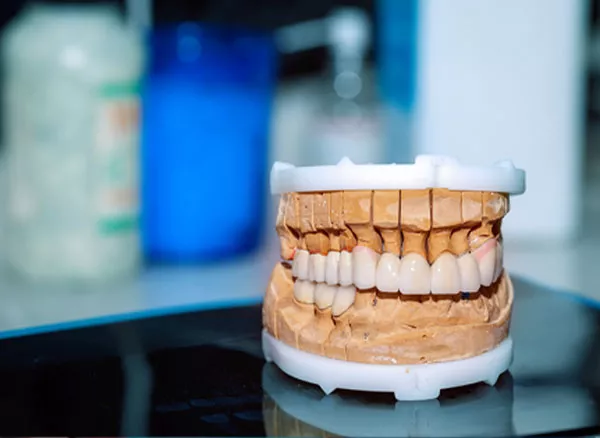What is Root Canal Treatment (Endodontics)?
Endodontics is a treatment method applied when the tissue called pulp, which is located inside the tooth and ensures the vitality of the tooth, becomes inflamed or damaged. Thanks to this treatment, tooth loss is prevented and oral health is preserved. Root canal treatment is performed by endodontists who specialize in dentistry.

Situations where canal treatment is necessary
Root root canal is usually necessary in the following cases:
Tooth decay: Decay can affect the enamel and dentin layers of the tooth, causing the pulp to become infected. In this case, root canal treatment may be required.
Tooth trauma: The pulp can be damaged as a result of a blow or serious injury to the tooth. Root canal treatment is applied to clean and heal the pulp.
Tooth abscesses: An abscess can form at the tooth root when the pulp becomes infected or damaged. In this case, root canal treatment may be required.
Tooth hypersensitivity: If excessive sensitivity is felt when consuming hot or cold foods and drinks, this may require root canal treatment.
How is Canal Treatment Performed?
Canal treatment is usually completed in several stages. Before starting the treatment, the dentist applies local anesthesia to relax the patient and reduce the feeling of pain. After the area is numb, the decayed or damaged area on the tooth is cleaned and a hole is opened to access the inside. By entering through the hole, the pulp tissue is completely removed and the root canals are cleaned. Then, the root canals are shaped using special tools and an environment in which bacteria are completely cleaned is created. The cleaned root canals are filled and sealed with a special filling material. After the root canal treatment is completed, the repair process begins. The hole on the tooth is closed with a filling or crown and the tooth is allowed to return to its former function.
The Importance of Canal Treatment
Canal treatment is a treatment method applied in cases of infection or damage to the pulp located on the inside of the tooth. This treatment is of great importance to prevent tooth loss and maintain oral health. Thanks to root canal treatment, the infected pulp is cleaned, inflammation is stopped and the tooth is maintained in a healthy state. An infected pulp; It can cause symptoms such as pain, tenderness, swelling and gum color changes. In these cases, root canal treatment is required immediately because as the infection progresses, an abscess may form at the root of the tooth and the tooth may be lost. With root canal treatment, this process is stopped and dental health is preserved. In addition, root canal treatment prices are a more economical option than other alternatives. Protecting and repairing the existing tooth, instead of having the tooth extracted or options such as implant, is both more advantageous in terms of cost and ensures the preservation of the natural tooth structure.
How long does the canal treatment take?
The duration of root canal treatment, which is usually completed in 1 to 3 sessions, varies depending on the condition of the tooth requiring treatment and the individual factors of the patient. In the first session, the inside of the tooth is cleaned, the pulp is removed and the root canals are shaped. A temporary filling is then placed. In the second session, the temporary filling is removed, the root canals are washed, disinfected and filled with a special substance. In the third session, a permanent filling or coating is applied to the tooth. The duration of all these procedures may vary depending on factors such as the structure of the tooth, the severity of the infection and compliance with the treatment. Your dentist will give you detailed information about this process and the procedure will begin after appropriate planning.
What is the Success Rate of Canal Treatment?
Canal treatment has a high success rate when performed properly. The success rate usually varies between 85% and 97%. However, the success rate also depends on factors such as compliance with treatment, paying attention to dental hygiene and following regular check-ups. As a result of successful root canal treatment, the tooth remains healthy and usable.
What happens if canal treatment fails?
Although root canal treatment generally has a high success rate, it can fail in rare cases. An unsuccessful canal treatment means that the treatment does not achieve its purpose or a new infection occurs. In case of an unsuccessful canal treatment, various problems may occur. After the treatment, the tooth If symptoms such as pain, sensitivity or swelling persist or if a new infection develops, there may be an unsuccessful root canal treatment. Due to various reasons, the existing infection may still continue and an abscess may form around the tooth. When the treatment fails, it may not be possible to preserve the tooth and extraction may be necessary.
After tooth extraction, prostheses such as implants or bridges can be placed in the area where the tooth is lost. However, these procedures are more invasive and may cost more. Therefore, it is important to successfully complete the root canal treatment and protect the tooth. In case of unsuccessful root canal treatment, re-canal treatment can be performed. In some cases where this is not possible, an appropriate restoration method may need to be applied.
Therefore, to increase the success rate of root canal treatment, it is important to go to regular dentist check-ups, practice good oral hygiene and follow post-treatment instructions. It is also important to see a dentist immediately if you experience any pain, tenderness, or other symptoms. For your Istanbul root canal treatment needs, you can call KlinikaDent and request an appointment and plan with your specialist dentist for a successful operation process.










